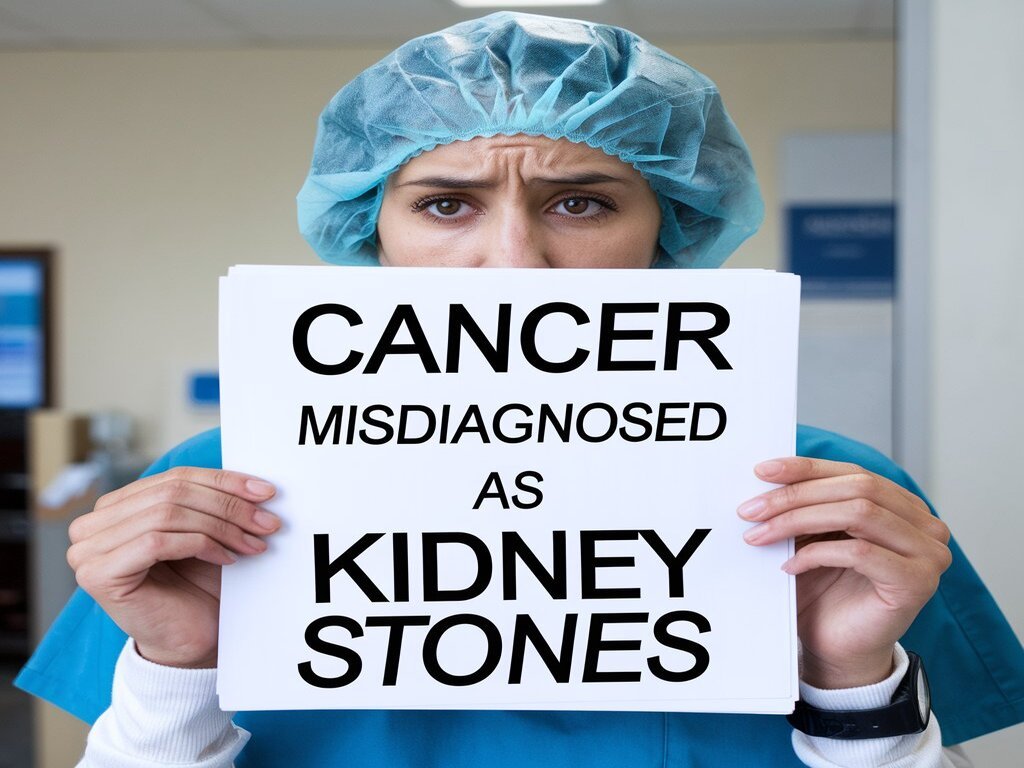Medically Reviewed and Compiled by Dr. Adam N. Khan, MD.
Can Cancer Be Mistaken for Kidney Stones?
Yes, it is possible for kidney cancer (Renal Cell Carcinoma) or bladder cancer to be misdiagnosed as kidney stones because both conditions share primary symptoms like blood in the urine and sharp side pain. While kidney stones are much more common
Medically Reviewed and Compiled by Dr. Adam N. Khan, MD.
Can Cancer Be Mistaken for Kidney Stones?
Yes, it is possible for kidney cancer (Renal Cell Carcinoma) or bladder cancer to be misdiagnosed as kidney stones because both conditions share primary symptoms like blood in the urine and sharp side pain. While kidney stones are much more common, doctors may sometimes stop investigating once a stone is found, potentially overlooking a tumor growing in the same area. Early detection is vital, so if symptoms persist after a stone is treated, further imaging like a CT scan or MRI is necessary to rule out malignancy.
Understanding the Overlap: Why the Confusion Happens
When you feel a sharp, stabbing pain in your lower back or see a tint of red in the toilet, your mind—and often your doctor’s mind—goes straight to kidney stones. Statistically, that is a fair guess. Kidney stones affect millions of people every year. Cancer, specifically kidney cancer, is rarer.
However, the “diagnostic trap” happens because the human body has limited ways of screaming for help. Both a jagged stone and a growing tumor cause irritation in the urinary tract. This irritation leads to the two “hallmark” symptoms: hematuria (blood in urine) and flank pain.
The Problem with “Shadows” on Scans
In a busy ER, a doctor might see a small shadow on an ultrasound and assume it is a stone. If you are younger, the bias toward stones is even stronger. The danger arises when a patient is sent home with pain meds and told to “wait for the stone to pass,” while a tumor continues to grow undetected.
The Warning Signs: When It’s More Than Just a Stone
While the symptoms look the same on the surface, there are subtle “red flags” that point toward something more serious than a mineral deposit.
1. Pain That Doesn’t “Wave”
Kidney stone pain is usually “colicky.” It comes in intense waves as the stone moves through the narrow tubes. Cancer pain is often a dull, constant ache that doesn’t go away, regardless of your position or hydration levels.
2. Unexplained Weight Loss
A kidney stone will make you miserable, but it rarely causes you to lose 10 pounds in a month. If you have back pain paired with a sudden drop in weight or a total loss of appetite, your doctor needs to look for a metabolic cause, such as cancer.
3. Persistent Low-Grade Fever
Cancer can cause a systemic inflammatory response. If you have a nagging fever that isn’t tied to a cold or the flu, and you also have urinary issues, it’s time to ask for a deeper look.
4. Anemia or Fatigue
Kidney tumors can mess with the body’s production of red blood cells. If you feel exhausted and look pale, this is a clinical sign that a simple stone wouldn’t typically cause.
Types of Cancer Often Misidentified
It isn’t just “kidney cancer” that gets lost in the shuffle. Several types of internal growths can mimic the sensation of a stone:
| Cancer Type | Why it looks like a Stone | Key Difference |
| Renal Cell Carcinoma | Causes blood in urine and side pain. | Often causes a palpable lump in the abdomen. |
| Bladder Cancer | Causes frequent urination and blood. | Pain is usually during urination, not in the back. |
| Ureteral Cancer | Blocks the flow of urine. | The blockage is permanent, not temporary like a stone. |
How Misdiagnosis Usually Occurs
In the world of 2026 medicine, we have amazing tools, but human error still exists. Here is how the ball usually gets dropped:
- Incomplete Imaging: An X-ray might show a stone but miss a soft-tissue tumor. Ultrasounds are great for stones but can be blurry when looking at small masses.
- The “One-Diagnosis” Bias: If a doctor finds a 3mm stone, they might stop looking for anything else. This is called “premature closure.”
- Age Bias: Doctors often assume patients under 50 don’t get kidney cancer. While it is less common, it is certainly not impossible.
- Symptom Masking: If you take heavy painkillers for a stone, you might mask the growing “dull ache” of a tumor.
Steps to Take if You Suspect a Misdiagnosis
If you have been treated for kidney stones but you still feel “off” after several weeks, you must be your own advocate. Don’t worry about “annoying” your medical team. It is your health on the line.
- Request a Contrast CT Scan: This is the gold standard. The dye helps doctors see the blood flow to a mass, which can help distinguish a stone from a tumor.
- Ask for a Cytology Test: This is a simple urine test that looks for actual cancer cells in the fluid.
- See a Urologist: General practitioners are great, but a urologist specializes in this “plumbing.” They know exactly what to look for.
- Track Your Symptoms: Keep a diary. Is the blood constant or intermittent? Does the pain move? This data is gold for a specialist.
Questions You Should Ask Your Doctor
To ensure you aren’t being overlooked, bring these questions to your next appointment:
- “We found a stone, but could there be a secondary cause for this bleeding?”
- “Does my imaging show any ‘filling defects’ or masses in the kidney wall?”
- “If this pain doesn’t stop in two weeks, what is our next diagnostic step?”
- “Can we run a blood panel to check my calcium and kidney function levels?”
Life After the Diagnosis: Why Early Catching Matters
The silver lining is that kidney cancer is highly treatable if caught early. Many tumors are slow-growing. If a “stone” turns out to be a small tumor, it can often be removed with robotic surgery, leaving the rest of the kidney intact. The danger only peaks when the “stone” is ignored for years, allowing the cancer to spread to other organs.
Medlifeguide give information about also kidney diseases, chronic kidney disease (CKD) and also diet plans for kidney health; reach out to acheive these information for your and your family’s health
Medical Disclaimer
All content published on medlifeguide is intended for informational and educational purposes only and does not substitute professional medical advice, diagnosis, or treatment. Always consult a qualified healthcare provider regarding any medical condition, symptoms, or treatment decisions.

